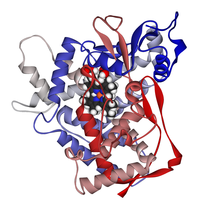
Photo from wikipedia
Major depressive disorder (MDD) is a progressive deteriorating mental state with a feeling of worthlessness and frequent mood swings. Several studies reported the favorable effects of natural drug substances on… Click to show full abstract
Major depressive disorder (MDD) is a progressive deteriorating mental state with a feeling of worthlessness and frequent mood swings. Several studies reported the favorable effects of natural drug substances on MMD associated oxidative stress and neuroinflammation. The present study is attempted to examine whether carveol could affect lipopolysaccharide- (LPS-) induced depression, and if so, how nuclear factor E2-related factor (Nrf2) contributed to the neuroprotective effects of carveol mechanistically. Two experimental cohorts were used using the SD rats: first to evaluate the promising dose of carveol (whether 20 mg/kg or 50 mg/kg) and secondly to determine the effect of carveol on Nrf2-mediated antidepression. Significant neuronal alterations were noticed in the cortex and hippocampus regions in the LPS-treated group, accompanied by elevated inflammatory cytokine levels such as tumor necrosis factor-alpha (TNF-α), cyclooxygenase (COX-2), and c-Jun N-terminal kinase (p-JNK). Moreover, amassing of free radicals exacerbated lipid peroxidase (LPO) and oxidative stress with a limited antioxidant capacity. Carveol (20 mg/kg) significantly ameliorated these detrimental effects by promoting the antioxidant Nrf2 gene and protein, which critically regulate the downstream antioxidant and anti-inflammatory pathway. To further elaborate our hypothesis, we employed all-trans retinoic acid (ATRA), an Nrf2 inhibitor, and we found that ATRA exaggerated LPS-induced depressive-like effects associated with elevated neuroinflammatory markers. Our results demonstrated that carveol (20 mg/kg) could activate the endogenous antioxidant Nrf2, which regulates the downstream antioxidant signaling pathway, eventually leading to amelioration of LPS-induced neuroinflammation and neurodegeneration.
Journal Title: Oxidative Medicine and Cellular Longevity
Year Published: 2022
Link to full text (if available)
Share on Social Media: Sign Up to like & get
recommendations!